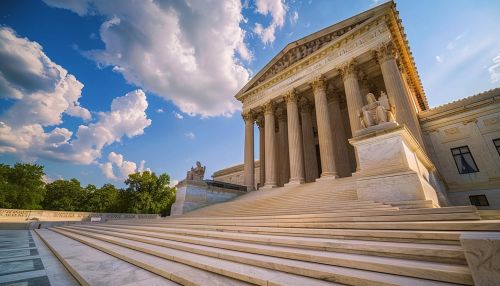Meritor Savings Bank v. Vinson
Background
Meritor Savings Bank v. Vinson is a landmark case in United States labor law, specifically concerning sexual harassment in the workplace. The case was decided by the Supreme Court of the United States in 1986 and established significant precedents regarding the interpretation of Title VII of the Civil Rights Act of 1964. Title VII prohibits employment discrimination based on race, color, religion, sex, and national origin. The case addressed whether a claim of "hostile work environment" sexual harassment could be actionable under Title VII.
Case Overview
Facts of the Case
Mechelle Vinson was employed by Meritor Savings Bank, formerly known as Capital City Federal Savings and Loan Association, from 1974 to 1978. During her employment, she alleged that Sidney Taylor, a vice president of the bank and her supervisor, had made unwelcome sexual advances towards her. Vinson claimed that Taylor had raped her multiple times and subjected her to a hostile work environment through continuous sexual harassment. She did not report these incidents to any higher authorities within the bank, fearing retaliation and job loss.
Legal Proceedings
Vinson filed a lawsuit against Meritor Savings Bank and Taylor, claiming that the sexual harassment created a hostile work environment in violation of Title VII. The District Court initially ruled in favor of the bank, stating that the sexual relationship between Vinson and Taylor was voluntary and that the bank was not liable for Taylor's actions. The Court of Appeals for the District of Columbia Circuit reversed this decision, holding that a claim of hostile work environment sexual harassment could be actionable under Title VII, regardless of whether the sexual advances were voluntary.
Supreme Court Decision
Majority Opinion
The Supreme Court, in a unanimous decision, held that a claim of hostile work environment sexual harassment is actionable under Title VII. Justice William Rehnquist delivered the opinion of the Court. The Court emphasized that the voluntariness of the sexual relationship is not a defense to a sexual harassment claim. Instead, the focus should be on whether the conduct was unwelcome and whether it created a hostile or abusive work environment.
The Court also clarified the standard for employer liability in cases of sexual harassment. It held that employers could be held liable for the actions of their employees if they knew or should have known about the harassment and failed to take appropriate corrective action. This established the principle of vicarious liability in cases of hostile work environment sexual harassment.
Concurring Opinions
Justice Sandra Day O'Connor wrote a concurring opinion, emphasizing the importance of considering the totality of the circumstances in determining whether a work environment is hostile or abusive. She highlighted that factors such as the frequency and severity of the conduct, whether it was physically threatening or humiliating, and whether it unreasonably interfered with an employee's work performance should be taken into account.
Legal Implications
Hostile Work Environment
The decision in Meritor Savings Bank v. Vinson significantly expanded the scope of Title VII by recognizing hostile work environment sexual harassment as a form of sex discrimination. This case established that employees have the right to work in an environment free from sexual harassment and that employers have a duty to prevent and address such conduct.
Employer Liability
The ruling also clarified the standard for employer liability in cases of sexual harassment. Employers can be held liable for the actions of their supervisors if they knew or should have known about the harassment and failed to take appropriate corrective action. This principle of vicarious liability has been instrumental in shaping workplace policies and practices aimed at preventing and addressing sexual harassment.
Subsequent Developments
Faragher-Ellerth Defense
The principles established in Meritor Savings Bank v. Vinson were further developed in subsequent Supreme Court cases, such as Faragher v. City of Boca Raton and Burlington Industries, Inc. v. Ellerth. These cases introduced the Faragher-Ellerth defense, which allows employers to avoid liability for hostile work environment sexual harassment if they can demonstrate that they exercised reasonable care to prevent and promptly correct any harassing behavior and that the employee unreasonably failed to take advantage of any preventive or corrective opportunities provided by the employer.
Impact on Workplace Policies
The decision in Meritor Savings Bank v. Vinson has had a profound impact on workplace policies and practices. Employers are now more vigilant in implementing anti-harassment policies, conducting training programs, and establishing procedures for reporting and addressing complaints of sexual harassment. The case has also raised awareness about the importance of creating a safe and respectful work environment for all employees.
See Also
- Title VII of the Civil Rights Act of 1964
- Faragher v. City of Boca Raton
- Burlington Industries, Inc. v. Ellerth
- Hostile Work Environment
- Vicarious Liability


